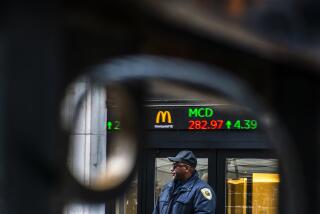Facebook tanks to post-IPO low below $30 as other stocks rise

Wall Street returned from Memorial Day weekend without any more love for Facebook Inc., sending the newly public company’s stock down nearly 8% to a new post-IPO low.
The social networking company was trading down 7.9% at $29.40 midday Tuesday in New York, down 22.6% from the $38-a-share price at which it debuted May 18.
Since the launch, Chief Executive Mark Zuckerberg has watched his business endure technical problems on the Nasdaq exchange and skepticism from analysts, many of whom believe the stock was overpriced and overhyped.
The stock market was otherwise in a cheery mood Tuesday. Trading was up 0.6% on the Dow to 12,524, up 0.4% to 2,848 on Nasdaq and up 0.5% to 1,324 on the S&P 500.
Promising news internationally helped boost spirits.
Reports out of China suggest that the Asian giant may be set to boost private spending in major state-controlled industries such as energy and oil.
And Greek polls over the weekend showed the pro-bailout New Democracy party leading leftist opponents before next month’s national elections, easing fears that Greece may abandon the euro currency in favor of the drachma.
But there’s still plenty to concern investors. Consumer confidence tumbled in May for the third straight month, according to the Conference Board. The closely watched S&P Case Shiller index of home prices showed values dropping year over year but inching up month over month.
Abroad, the specter of the European debt crisis continues to loom. Recently nationalized Spanish lender Bankia said last week that it needed $23.8 billion, or 19 billion euros, in state aid. The country’s borrowing costs were hovering near record highs yesterday.
RELATED:
Facebook IPO flop drawing increased scrutiny
Facebook, Morgan Stanley face class-action suit over IPO
Congressional committees looking into Facebook IPO problems
Follow Tiffany Hsu on Twitter and Google+
More to Read
Inside the business of entertainment
The Wide Shot brings you news, analysis and insights on everything from streaming wars to production — and what it all means for the future.
You may occasionally receive promotional content from the Los Angeles Times.











